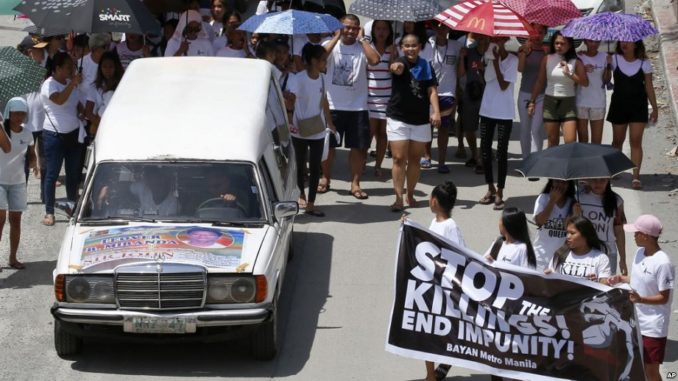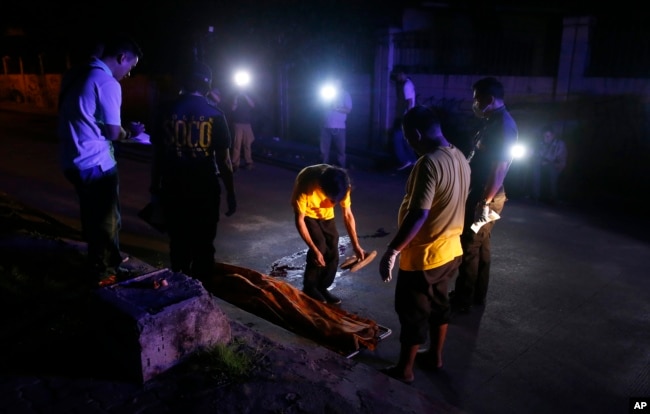
A Philippine Catholic leader said Sunday that church bells would be rung every night for three months across his northern district to raise alarm over a sharp spike in police killings of drug suspects, adding to a growing outcry over President Rodrigo Duterte’s bloody crackdown.
Archbishop Socrates Villegas said church bells would toll for 15 minutes nightly across his religious district from Tuesday to Nov. 27 to rouse a citizenry “which has become a coward in expressing anger against evil.” The start and end of the protest mark days of Catholic veneration.
The move comes after more than 80 drug and crime suspects were gunned down by police in metropolitan Manila and nearby Bulacan province in just three days last week, the bloodiest few days since Duterte’s crackdown started in July last year.
“The sounding of the bells is a call to stop approval of the killings,” Villegas, who also heads an influential bloc of Filipino Catholic bishops, said in a statement read Sunday in churches in his district in Pangasinan province. “The country is in chaos. The officer who kills is rewarded and the slain get the blame. The corpses could no longer defend themselves from accusations that they `fought back.”‘
“Why are we no longer horrified by the sound of the gun and blood flowing on the sidewalks? Why is nobody raging against drugs that were brought in from China?” Villegas asked, referring to a huge drugs shipment that managed to pass through Manila’s ports under the watch of Customs officials appointed by Duterte.
Without naming the president, Villegas criticized Duterte’s praises for police killings of 32 drug suspects in just a night of raids across Bulacan province last week and how his supporters applauded in response.
In a separate statement read in Manila churches, Cardinal Luis Antonio Tagle offered to host a dialogue on the drug problem among government and police officials, along with families of victims, non-government groups and medical experts.
Anger and protests have focused on last week’s shooting death of a teenager, Kian Lloyd Delos Santos, who police say was a drug dealer who opened fire with a pistol during a raid, prompting law enforcers to shoot him. The family of the slain 17-year-old student, however, says he was mercilessly shot by police as he was pleading for his life.
Police said the student attempted to escape during a raid that sparked a chase Wednesday night in suburban Caloocan city in Manila metropolis. The student’s grieving parents and some neighbors denied the police claim, pointing to security camera footage that showed a man, who they said was Delos Santos, being held by both arms and dragged away from his home shortly before he was shot nearby.
Vice President Leni Robredo condemned the killing and visited the wake of the slain student early Sunday accompanied by a volunteer lawyer, who she said may be able to help the victim’s family attain justice. She acknowledged that the country has a big drug problem, but said the solution should not trample on human rights and victimize the innocent.
Amid the outcry, police officials removed three police officers involved in the killing of delos Santos, along with their commander, and ordered an investigation.
Senators allied with Duterte were to hold a meeting Sunday to discuss a possible investigation of the killings of delos Santos and dozens of other people last week. Two of them spoke in radio interviews, warning policemen not to abuse Duterte’s strong backing of law enforcers involved in his campaign against illegal drugs.
“Legitimate police operations are OK, but summary executions have no place in our society because they’re barbaric acts,” Sen. Joseph Victor Ejercito told DZBB Radio. “They should not go overboard.”
More than 3,200 drug suspects have been gunned down by police since Duterte launched his crackdown. More than 2,000 others have died in drug-related killings, including attacks by motorcycle-riding masked gunmen, who human rights groups allege are policemen in disguise or their civilian hit men.
Alarmed human rights groups have reported higher death tolls.
Duterte has acknowledged he erred in his initial estimate – and campaign promise – to end the drug menace in three to six months and added that it would be difficult to have the problem under control during his six-year term. The crackdown, however, will not stop under his watch, he said.
Source – VOA

